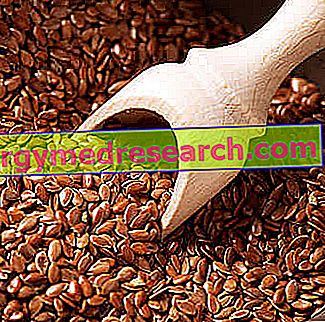Nutritional properties
Linen ( Linum usitatissimum ) is an annual herbaceous plant that grows spontaneously, but can also be cultivated, as the Egyptians, Jews and Phoenicians had already learned to make precious textile fibers for.

Thanks to their emollient and protective properties, flax seeds can also be used as an infusion to calm internal inflammation (digestive tract, urinary tract) or external (skin).
In the literature there are some preliminary evidences on the possible antitumor properties of linseed, with reference to prostate cancer; these properties would be due to the generous content in lignans. Although the evidence is weak and divided, it is however proved that omega-3 fatty acids, abundant in flax seeds, positively modulate the inflammatory response and the activity of the immune system; this could result in a protective role for prostate health. The conditional is clearly mandatory, as the actual extent of this benefit remains uncertain.
Flax seeds also boast an excellent content of mineral salts, proteins (20-25%) and lipids (30-40%). The latter are rich in triglycerides, consisting of:
- α-linolenic acid, progenitor of ω3 (> 50%)
- progenitor linoleic acid of ω6 (25%)
- oleic acid, monounsaturated characteristic of olive oil (10-18%)
- saturated fatty acids (5-10%)
Nutritional values
Nutritional composition for 100 grams of Linseed | |||||||||||||||||||||||||||||||||||||||||||||||||||||||||||||||||||||||||||||||||||||||||||||
 | |||||||||||||||||||||||||||||||||||||||||||||||||||||||||||||||||||||||||||||||||||||||||||||
| |||||||||||||||||||||||||||||||||||||||||||||||||||||||||||||||||||||||||||||||||||||||||||||
Linseed oil
From the seeds of flax the homonymous oil can be obtained, consisting mainly of triglycerides rich in essential polyunsaturated fatty acids (ω3 and ω6 or vitamin F).
The supply of these nutrients must necessarily come from the diet, since the body is not able to produce them from other lipid substrates. It should also be said that the use of linseed oil is particularly useful for rebalancing the ratio between ω3 and ω6, which due to the modern food style is often unbalanced in favor of the latter. In this regard, linseed oil is certainly better than olive oil and traditional seed oils, but less effective than fish oils, because it is poor in eicosapentaenoic acid (EPA) and docosahexaenoic acid (DHA).
An adequate supply of undifferentiated alpha-linolenic acid, through the regular consumption of linseed oil, is however effective in protecting the body from cardiovascular diseases and from some inflammatory-neurodegenerative diseases.
The antioxidant activity is enhanced by the discreet content of vitamin E, however insufficient to prevent the rancidity to which the linseed oil is particularly subject.
Good also the presence of lecithin, a set of phospholipids necessary for the proper functioning of the nervous system and the brain.
This oil also has anti-haemorrhoidal, anticolytic and regulatory properties on intestinal function.
To know more:
Linseed oil as food: extraction, properties and warnings for use »
Linseed Oil as Supplement: Benefits and Properties »
Use and storage mode
Two teaspoons of linseed oil a day are able to satisfy, on their own, the daily need for alpha-linolenic acid (ω3). To be assimilated and best processed in their derivatives, the polyunsaturated fatty acids present in linseed oil should preferably be taken in meals low in animal fats and simple sugars. This food can therefore be used to flavor a light meal of vegetables and white meat. It is important not to exceed the recommended intake rates. Only by combining it with traditional lipid sources is it possible to meet the needs of all fatty acids, including saturated acids, which at the right doses are however fundamental for optimal physical efficiency. The same applies to cholesterol.
| FOOD (100 g) | ω-3 | ω-6 | ω-6: ω-3 | |||
| DHA (g) | EPA (g) | LNA (g) * | totals (g) | totals (g) | - | |
| Salmon oil | 18.232 | 13, 023 | 1, 061 | 35.311 | 1, 543 | 0.04: 1 |
| Liver oil of cod | 10, 968 | 6, 898 | 0, 935 | 19.736 | 0, 935 | 0.05: 1 |
| Sardine oil | 10.656 | 10, 137 | 1, 327 | 24.093 | 2, 014 | 0.08: 1 |
| Flax seed | 0 | 0 | 22.813 | 22.813 | 5, 911 | 0.26: 1 |
| Linseed oil | 0 | 0 | 53.304 | 53.304 | 12, 701 | 0.24: 1 |
| Walnut oil | 0 | 0 | 10, 400 | 10, 040 | 52.890 | 5.27: 1 |
| Olive oil | 0 | 0 | 0761 | 0.761 | 9, 763 | 12.83: 1 |
However, the richness of polyunsaturated fatty acids has the defect of amplifying the problems of preservation; Flaxseed oil, in fact, goes rancid quickly and must be obtained by cold pressing, since these fatty acids easily alter with high temperatures (for this reason it must always be used raw, never for frying or fried). Even the crushed seeds must be used within a few days to avoid the aforementioned rancidity phenomena.
Oxidation, which would make this food unsuitable for dietetic use, is however exploited in the industrial field. In fact, if exposed to the air, the linseed oil forms a solid brown mass, which is used in the preparation of paints and paints.
Linseed oil is generally sold in small bottles (250 or 500 ml), has a short shelf life and must necessarily be consumed within one month of opening. To protect it from light and heat, it should be stored in well-sealed opaque bottles and stored in a cool place (in the fridge after opening, with the cap tightly closed). On the market there are also capsules or pearls of linseed oil which, however, provide a modest quantity of essential fatty acids, unless you consume several capsules per day (equivalent to a dose of at least 3 grams / day of linseed oil).
Linseed: Whole or Ground?
Many experts or alleged ones recommend the consumption of ground flax seeds, discouraging the ingestion of whole flax seeds; the latter, in fact, would be scarcely digestible, with the risk of expelling a large part of the dose taken with the faeces, without absorbing their nutritive principles.

Whole Flax Seeds (Above) and Ground Flax (Below)
Although this recommendation is quite widespread, in the literature there are no important experiments supporting this hypothesis. On the other hand, a study seems to confirm that: fatty acids and lignans in NON-GROUND seeds taken through bars would in any case be absorbed and metabolized.
To clarify the subject, we could say that a lot depends on the purposes for which the flax seeds are taken:
- if the purpose is to regularize the intestine and reduce the absorption of dietary fats, the flax seeds can be taken either whole (preferably) or ground, with the foresight to accompany them to generous doses of water to promote the swelling of the mucilage;
- if the purpose is to increase the intake of omega-3 (alpha linolenic acid) it is preferable to take ground flax seeds; in this regard it is recalled that, once ground, the product tends to decay quite quickly, due to the oxidation of omega-3 (rancidity). Therefore, when possible, it is preferable to grind whole linseeds personally, keeping the product in the refrigerator, in tightly closed containers for no more than a few days.
Variety
There are two main varieties of flax seeds: yellow (golden) and brown. Most varieties have similar nutritional characteristics, including similar concentrations of omega three.

Flax seeds in the kitchen
In the kitchen, flax seeds can be added at will to bread and savory dough (pizza, focaccia), to salads, to sweet dough (baked cakes, muffins, etc.), to improve its nutritional and taste properties (give it a touch of crunchiness to the recipe).
The flax seeds and flour obtained from them are widely used in vegetarian and vegan cuisine, both for their nutritional virtues and for some technical characteristics. The excellent emulsifying properties of finely powdered linseed make them an excellent substitute for eggs.
Recipes with Linseed »



